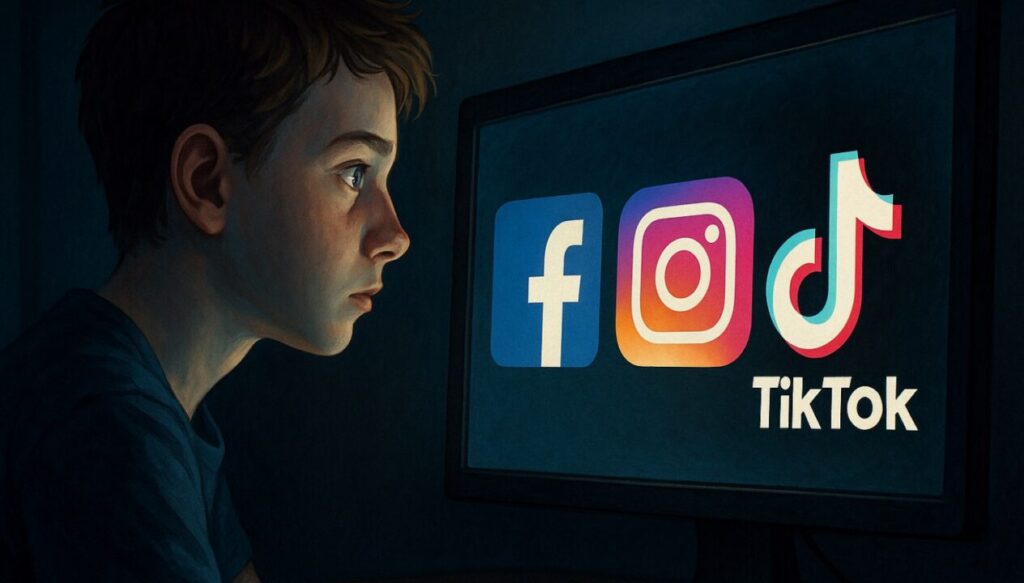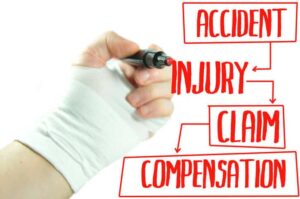If you’re considering a social media addiction lawsuit, Jason Stone Injury Lawyers can help you navigate the complexities. The initial consultation is free, and we only get paid from the settlement proceeds, so you never need to reach into your pocket to pay us.
Social Media Platforms are being held liable for knowingly designing features that exploit psychological triggers, causing mental and physical harm, especially to teens.
Claims often rely on proving negligence and addictive algorithmic designs prioritizing engagement over well-being.
Gathering medical records and expert reports is crucial to document damages like anxiety or depression.
Understanding legal deadlines and claim strategies will strengthen your case.
Learn what recent court rulings mean for your rights and next steps by consulting a Boston Personal Injury Lawyer.
Key Takeaways
- Social media addiction lawsuits claim platforms knowingly caused psychological harm, especially to teens, through addictive algorithmic designs.
- Plaintiffs use negligence, product liability, and consumer protection laws to hold companies accountable for addiction and mental health impacts.
- Evidence includes user data, medical records documenting anxiety, depression, and expert reports on behavioral addiction and algorithm manipulation.
- Over 970 cases are consolidated into MDLs, primarily against Meta, focusing on corporate knowledge of teen harm and internal research neglect.
- Damages cover medical and therapy costs and emotional distress. Expert testimony is used to establish causation and quantify harm.
Understanding the Social Media Addiction Lawsuit Landscape
While social media platforms have revolutionized communication, they’ve also sparked a growing wave of legal actions due to their addictive nature and harmful impact on youth mental health. If you’re considering a social media addiction lawsuit, understanding the legal landscape is vital.
Social media companies’ liability centers on whether platforms knowingly contributed to addiction and mental harm among users, particularly teens. The legal process for social media addiction involves detailed case evaluations, gathering evidence of addiction, and related psychological damages. Plaintiffs seek damages in social media addiction claims to cover medical treatment, therapy, and ongoing care costs.
Many cases are consolidated into Multi-District Litigations (MDLs) to streamline proceedings. Settlements often resolve claims without trial, offering compensation while avoiding prolonged litigation. Knowing this framework helps you steer your options effectively, ensuring your claim addresses the core issues of liability and harm caused by social media platforms.
Legal Theories Behind Social Media Addiction Claims
Social media addiction claims often rest on legal theories like negligence and duty, arguing that platforms failed to protect vulnerable users. Product liability claims assert that addictive design features constitute a defect causing harm.
Additionally, consumer protection laws may apply when companies engage in deceptive practices about the risks of their apps.
Negligence and Duty
Because social media companies design their platforms to maximize user engagement, they owe a legal duty to protect vulnerable users, especially teens, from foreseeable harm caused by addictive features. You must understand that negligence claims focus on breaches of this duty of care, where companies fail to implement safeguards in their algorithmic design to prevent addiction.
To establish social media liability, you’ll need clear evidence that platforms ignored known risks or concealed harmful effects. Preserving internal records and communications is vital for proving negligence, as these documents reveal awareness of addiction issues.
By holding companies accountable for their duty, you can challenge their prioritization of engagement over user well-being, emphasizing the legal obligation to prevent foreseeable mental health harms linked to addictive social media features.
Product Liability Claims
Although social media addiction claims often focus on negligence, product liability offers another powerful legal theory by holding platforms accountable for designing inherently dangerous features. You can challenge social media companies’ addiction liability by arguing their algorithmic design and social media addiction mechanisms create foreseeable harm. These designs deliberately exploit psychological vulnerabilities to maximize user engagement, leading to addiction and mental health issues.
Filing a social media addiction claim involves demonstrating that the platform’s features were defectively designed or lacked adequate warnings. Product liability claims assert that harm resulted directly from these design flaws. Successful cases may lead to significant social media addiction lawsuit settlement amounts, compensating victims for treatment and damages. This legal approach forces platforms to reconsider their design choices and prioritize user safety.
Consumer Protection Laws
Consumer protection laws provide an essential legal foundation for social media addiction claims by addressing deceptive practices and unfair business conduct. When pursuing your claim, understanding the statute of limitations for social media addiction lawsuits is fundamental to preserving your right to sue.
You’ll need to focus on evidence preservation for social media addiction suits, including internal company documents revealing knowledge of addictive design features. Expert testimony in social media addiction cases often plays a pivotal role, clarifying how platforms intentionally foster dependency. Calculating damages in social media addiction claims involves quantifying psychological harm, treatment costs, and ongoing care expenses.
By leveraging consumer protection laws, you can hold platforms accountable for misleading users and seek appropriate compensation for the significant mental health impacts caused by their practices.
Platforms and Entities Facing Social Media Addiction Lawsuits
You’re likely aware that major platforms like Facebook, Instagram, TikTok, Snapchat, and their parent companies face numerous lawsuits alleging social media addiction harms. These legal claims focus on the platforms’ design choices that allegedly exploit addictive behaviors and contribute to mental health issues among teens.
Understanding the industry impact requires examining how these lawsuits challenge corporate accountability and may influence future regulatory actions.
Major Platforms Targeted
Five major social media platforms stand at the center of ongoing addiction lawsuits due to their significant impact on youth mental health. These platforms face class action social media addiction litigation, with claims focusing on mental health impacts in social media addiction lawsuits.
Plaintiffs argue these entities designed features that exploit addictive behaviors, contributing to anxiety, depression, and other harms among teens.
| Platform | Parent Company | Lawsuit Focus |
| Meta | Teen addiction, mental health | |
| TikTok | ByteDance | Algorithmic addiction effects |
| Meta | Concealed research on harms | |
| Snapchat | Snap Inc. | Exposure to harmful content |
| YouTube | Reward system and addiction |
You should understand that these platforms are the primary targets as litigation progresses.
Legal Claims Overview
How do social media companies face legal challenges over addiction claims? You’ll see lawsuits targeting major platforms like Meta (Facebook and Instagram), Snap (Snapchat), ByteDance (TikTok), and Google.
Plaintiffs argue these companies engineered addictive algorithms that overstimulate teens’ reward systems, causing mental health issues such as anxiety, depression, and self-harm. You’ll find over 970 cases consolidated into Multi-District Litigation, primarily accusing Facebook and Instagram of neglecting internal research revealing harm to teens.
These suits claim platforms concealed risks and failed to protect vulnerable users. The legal actions seek damages for medical and psychological treatment costs due to addiction-related harms. You can expect detailed case reviews evaluating exposure and harm, emphasizing the companies’ responsibility for the addictive design and its consequences on youth mental health.
Industry Impact Analysis
The legal claims against social media companies have sparked significant scrutiny on the platforms and entities involved in promoting addictive digital environments. Major platforms like Facebook, Instagram, TikTok, and Snapchat are at the center of these lawsuits, as they’re accused of designing algorithms that exploit teens’ vulnerabilities.
Meta, Snap, ByteDance, and Google face allegations of concealing research on addiction risks and downplaying mental health harms. These lawsuits focus on the companies’ knowledge of their products’ impact and failure to mitigate harm. As a result, these entities confront not only legal challenges but also reputational damage and potential regulatory reforms aimed at curbing addictive features.
Understanding this industry impact helps you grasp the broader implications for social media governance and user safety.
How Algorithmic Design Contributes to Addiction
Because social media platforms rely on sophisticated algorithms designed to maximize user engagement, they often prioritize content that triggers strong emotional responses, which can lead to addictive behaviors. These algorithms analyze your interactions—likes, shares, comments—to tailor a personalized feed that continuously offers highly stimulating and emotionally charged content.
This targeted delivery exploits your brain’s reward system by providing unpredictable, variable rewards, reinforcing repeated usage. You may be scrolling longer as the algorithm adapts in real time, presenting increasingly compelling material to maintain your attention.
Furthermore, infinite scrolling and autoplay remove natural stopping cues, further promoting extended sessions. These design choices effectively foster dependency by continuously optimizing content for engagement rather than well-being.
Understanding this mechanism reveals how algorithmic design manipulates your attention and behavior, making it challenging to disengage despite potential negative consequences. This insight is essential in recognizing the structural factors contributing to social media addiction.
Recognizing the Mental and Physical Harms of Social Media Addiction
Even if you’re unaware of it, social media addiction can seriously affect both your mental and physical health. Mentally, excessive use often leads to anxiety, depression, lowered self-esteem, and body dysmorphia, primarily driven by social comparisons, cyberbullying, and FOMO.
These conditions can intensify each other, creating a harmful cycle. Physically, addiction may result in disrupted sleep patterns, eye strain, and sedentary behavior, increasing risks for headaches, fatigue, and other health issues. Your brain’s reward system becomes overstimulated by constant notifications and likes, reinforcing compulsive checking and usage despite negative consequences.
Teens are especially vulnerable, as their developing identities and brains heighten susceptibility to these harms. Recognizing these effects early is vital, as untreated addiction can exacerbate psychological distress and physical symptoms.
Key Evidence: Preserving User Data, Medical Records, and Expert Reports
You must promptly secure and preserve all relevant user data, including social media activity logs demonstrating addictive behavior. Accurate handling of medical records is vital to document the physical and psychological impacts tied to social media use.
Expert reports will provide crucial analysis linking the platform’s design to harm, bolstering your case with scientific and clinical credibility.
Importance of Data Preservation
When pursuing a social media addiction lawsuit, preserving vital evidence such as user data, medical records, and expert reports is pivotal in building a strong case. You must secure digital records showing usage patterns, interactions, and platform activity to demonstrate addictive behavior.
Maintaining medical documentation that details diagnoses and treatment related to addiction strengthens your claim of harm. Expert reports analyzing the impact of social media algorithms and behavioral addiction provide objective support to establish causation. Timely preservation prevents evidence loss or alteration, ensuring data integrity throughout litigation.
You must coordinate with legal counsel to immediately implement proper data retention protocols, safeguarding all relevant materials. This meticulous approach enhances your ability to prove the platform’s responsibility and supports successful legal outcomes.
Medical Records Handling
Since medical records provide essential documentation of diagnoses, treatments, and ongoing care related to social media addiction, handling them with utmost care is indispensable for building a strong legal case. You must guarantee these records are collected, preserved, and presented accurately to establish the extent of harm. Proper management prevents data loss or tampering, which could weaken your claim.
Key steps include:
- Securing complete medical histories showing addiction-related mental health impacts
- Maintaining confidentiality and complying with privacy laws (e.g., HIPAA)
- Organizing records chronologically to demonstrate treatment progression
- Coordinating with healthcare providers to obtain detailed treatment notes
Role of Expert Reports
Although preserving user data and medical records forms the foundation of a social media addiction lawsuit, expert reports play a vital role in interpreting this evidence and establishing causation. You rely on these reports to clarify intricate relationships between social media use and mental health outcomes, such as anxiety or depression.
Experts analyze behavioral patterns, neurological impacts, and platform algorithms to demonstrate how addiction develops and affects teens.
Their detailed assessments support claims by linking documented user activity with psychological harm. Additionally, expert testimony helps courts understand the significance of internal company research, which may reveal knowledge of harmful effects. Without these reports, proving liability becomes challenging.
Consequently, extensive expert evaluations are indispensable to substantiating your case and obtaining appropriate legal remedies.
The Role of Expert Witnesses in Proving Social Media Addiction
Because proving social media addiction involves intricate psychological and behavioral factors, expert witnesses play a vital role in litigation. They provide the specialized knowledge needed to establish the existence, severity, and consequences of addiction linked to social media platforms. When you rely on expert testimony, you gain clarity on complex medical and behavioral evidence that can influence case outcomes.
Expert witnesses are essential to clarify complex psychological evidence in proving social media addiction in court.
Expert witnesses typically assist by:
- Diagnosing social media addiction using established clinical criteria and assessment tools.
- Explaining the neurological and psychological mechanisms underpinning addictive behaviors.
- Demonstrating how platform design and algorithms exacerbate addictive patterns.
- Linking addiction symptoms to documented mental health harms, such as anxiety or depression.
Their objective evaluations strengthen your case by validating claims of harm and causation, helping courts understand the nuanced impact of social media addiction. Without expert input, proving these connections would be significantly more challenging.
Statutes of Limitations and Filing Deadlines Across the U.S
When pursuing a social media addiction lawsuit, you must act within specific statutes of limitations that vary by state and claim type. These deadlines define the maximum time after an injury within which you can file a claim.
Typically, personal injury claims, including psychological harm from social media addiction, have limitation periods ranging from one to six years, depending on jurisdiction. In Massachusetts, it is usually three years. For minors, many states, including Massachusetts, extend filing deadlines, often pausing the clock until the child reaches adulthood, acknowledging the delayed manifestation of harm.
Identifying which statute applies to your case—negligence, product liability, or intentional misconduct—is vital as this affects the timeline. Missing these deadlines generally results in dismissal, barring you from recovery.
Consulting with Jason Stone Injury Lawyers promptly ensures you meet all filing requirements and maximize your chances for compensation. Remember that federal and state laws may intersect, especially if multi-district litigation is involved, necessitating careful adherence to all procedural deadlines.
Calculating Damages: Medical Costs, Therapy, and Emotional Distress
When calculating damages, you need to precisely estimate medical expenses related to treating social media addiction’s physical and mental effects. You should also assign accurate values to therapy sessions based on frequency, duration, and provider rates. Additionally, quantifying emotional distress requires clear documentation of psychological impact and its influence on daily life.
Estimating Medical Expenses
Estimating medical expenses in social media addiction lawsuits requires a thorough assessment of both direct and indirect costs related to treatment and emotional distress. You’ll need to document all relevant medical bills and therapy-related expenses carefully.
Additionally, consider the long-term nature of care for mental health conditions triggered or worsened by addiction. Emotional distress damages, though less tangible, must be quantified based on clinical evaluations and expert testimony.
Critical factors to include are:
- Hospitalization and emergency care costs arising from addiction-related crises
- Outpatient treatments, including psychiatric and psychological services
- Prescription medications are prescribed to manage symptoms
- Lost wages or reduced earning capacity due to mental health impairments
Therapy Session Valuation
Because therapy sessions often represent a significant portion of treatment costs in social media addiction cases, accurately valuing these sessions is crucial for calculating all-encompassing damages. You’ll need to contemplate the type of therapy provided—whether cognitive-behavioral, group, or family—as costs vary accordingly.
Documenting the number of sessions, their duration, and the therapist’s credentials helps establish a precise monetary value. Additionally, you should include related expenses such as psychological assessments or specialized treatment programs. Insurance coverage and out-of-pocket payments must be factored in to determine the individual’s actual financial burden.
This detailed valuation supports a fair calculation of damages and strengthens your claim by clearly linking therapy costs to the harm caused by social media addiction.
Quantifying Emotional Distress
Although emotional distress is intangible, you can quantify it by thoroughly documenting its psychological and physical impacts linked to social media addiction. To calculate damages, you’ll need detailed records of medical costs, therapy sessions, and ongoing treatment expenses.
Emotional distress includes anxiety, depression, and other mental health challenges resulting from addictive platform use. Precise valuation relies on objective evidence from healthcare providers and therapists.
Key factors to document in a Social Media lawsuit include:
- Medical bills and prescriptions related to mental health treatment
- Therapy session frequency, duration, and costs
- Professional assessments linking symptoms to social media use
- Personal records detailing emotional and physical symptoms over time
Class Action vs. Individual Claims: Pros, Cons, and Strategy
Understanding the differences between class action lawsuits and individual claims is crucial for developing an effective strategy when deciding how to pursue legal action related to social media addiction. Class actions consolidate similar claims, allowing you to share litigation costs and increase negotiating power against large social media companies.
This approach can lead to faster resolutions and uniform outcomes, but may limit your control over settlement terms and individual compensation amounts. On the other hand, individual claims give you more autonomy to tailor your case and potentially secure higher damages based on specific harms. However, they often involve higher costs, longer timelines, and greater risks.
Strategically, if your harm aligns closely with common claims and you prefer collective strength, a class action suits you. Pursuing an individual claim may better address your needs if your situation involves unique or severe damages. Evaluating these factors with experienced legal counsel will help you choose the best path.

Recent Bellwether Trials and Notable Verdicts
As recent bellwether trials progress, they offer pivotal insights into how courts evaluate social media addiction claims and the potential outcomes for plaintiffs. These trials test crucial legal issues, such as platform liability, addiction evidence, and harm causation.
You’ll see that verdicts shape future case strategies and settlement negotiations by clarifying judicial stances on responsibility and damages.
Crucial takeaways from notable verdicts include:
- Courts demand robust scientific evidence linking addiction to platform design.
- Plaintiffs must demonstrate measurable psychological or physical harm.
- Some rulings highlight platform concealment of harmful research, influencing liability.
- Compensation awards vary widely, reflecting case specifics and jurisdictional differences.
Next Steps: Filing Your Free Social Media Addiction Lawsuit Evaluation with Jason Stone Injury Lawyers
Before pursuing a social media addiction lawsuit, you should file a free case evaluation with Jason Stone, a seasoned attorney at Jason Stone Injury Lawyers who focuses on representing clients harmed by addictive social media platforms. Jason Stone and his team will review your situation, assess eligibility, and explain legal options tailored to your case.
This evaluation involves no fees and helps you understand potential compensation for treatment and related damages.
| Step | What You Provide | What You Receive |
| Initial Contact | Basic info: platforms used, age | Free eligibility assessment |
| Case Review | Details of addiction and harm | Expert legal analysis |
| Consultation | Questions and concerns | Clear next steps guidance |
| Decision to Proceed | Consent to representation | Dedicated attorney support |
Filing this evaluation is your first vital move toward justice and recovery.
Get Help Filing a Social Media Addiction Lawsuit
After completing your free case evaluation with Jason Stone Injury Lawyers, you gain access to professional guidance on filing your social media addiction lawsuit. This support helps you assess complex legal procedures while protecting your rights and interests. You’ll receive assistance gathering evidence, documenting harms, and meeting legal deadlines.
When you file your lawsuit, expect help with:
- Evaluating the strength of your case based on addiction impact and platform use
- Preparing necessary legal documents and claims accurately
- Communicating with defendants and managing negotiations or settlements
- Coordinating with medical or mental health experts for supporting testimony
Jason Stone’s team’s expertise ensures you understand each step, deadlines, and potential outcomes. Working with a knowledgeable attorney enhances your chances of securing compensation for treatment, therapy, and related damages. Don’t hesitate to utilize this professional aid to pursue justice efficiently and effectively.
If you or a loved one under 21 has suffered mental or physical harm from social media addiction, taking legal action can help hold platforms accountable and secure necessary support. Understanding the lawsuit process and your options is essential.
By filing a claim, you can seek compensation for treatment and recovery. And you never have to reach into your pocket to pay us. We only get paid from the proceeds of the resolution you receive.
Don’t wait—get a free evaluation with Jason Stone Injury Lawyers today to explore your legal rights and begin protecting your, and your children’s, future against the harmful effects of addictive social media design.
Not Trusting What You’re Being Told?
Better Phone Stone
(800) 577-5188
 START MY NO OBLIGATION CONSULTATION
START MY NO OBLIGATION CONSULTATION











